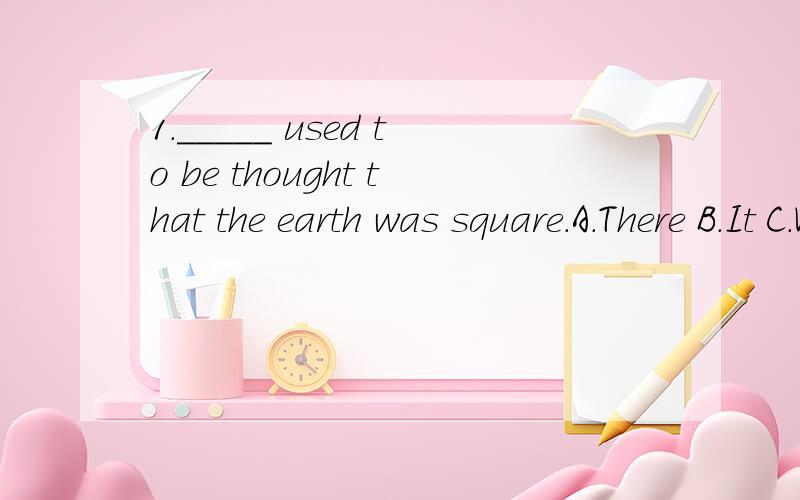1._____ used to be thought that the earth was square.A.There B.It C.What D.That为什么选B不选A?不是there be句型吗?2.The teacher wants ____ student to succeed.However,not ___ can findhis or her way to success.A.every;each B.each;each C.each;
来源:学生作业帮助网 编辑:作业帮 时间:2024/11/28 16:41:54

1._____ used to be thought that the earth was square.A.There B.It C.What D.That为什么选B不选A?不是there be句型吗?2.The teacher wants ____ student to succeed.However,not ___ can findhis or her way to success.A.every;each B.each;each C.each;
1._____ used to be thought that the earth was square.
A.There B.It C.What D.That
为什么选B不选A?
不是there be句型吗?
2.The teacher wants ____ student to succeed.However,not ___ can find
his or her way to success.
A.every;each B.each;each C.each;every D.each;someone
为什么选C不选A?
我觉得前面强调整体,后面强调个体
3.John had often heard ___ said that Marley had no money.
A.it B.this C.that D.one
为什么选A不选D?one指代某个人
4.____ is human nature that everyone wants to love and to be loved.
A.Such B.So C.That D.This
为什么选A不选D?this指代下面提到的that everyone wants to love and to be loved.
5.Professor Li forgot ___ room he was supposed to live in,didn't he?
A.which B.what
为什么选A?这里room没有范围,为什么不用what?
希望亲们可以解释得详细一点
好的加分噢↖(^ω^)↗ ↖(^ω^)↗
1._____ used to be thought that the earth was square.A.There B.It C.What D.That为什么选B不选A?不是there be句型吗?2.The teacher wants ____ student to succeed.However,not ___ can findhis or her way to success.A.every;each B.each;each C.each;
1.B 这里的It没有具体意思,只是作为句子开头的代用词而已.There be的句型是指这里有某物,there be是有实际意义的.
2.C 前面强调整体,后面强调个体.你的想法是对的,each确实有整体的意思,而every就比较个体化.
3.A 这里的it也是代用词,用来引领后面的句子,没有实际意义.而这句话的意思并没有说某一个特定的人有说marley had no money,所以不用One,如果是John had often heard that Mary/David said that Marley had no money,就是可以的.
4.A 如果是this代指的话,everyone wants to love and to be loved不应该和this出现在同一句话里面,这样的话就重复了,应该是Everyone wants to love and to be loved.This/Such is human nature.而such就不存在这个问题.这个句子还可以是It is human nature to love and to be loved.
5. A 为什么选A?这里room没有范围,为什么不用what?
因为professor Li只住在一间房里,那么这间房就是特指,所以用which,哪一间.而what是指什么的意思,不是哪一间的意思.
希望答案对你有用.
1what引导主语 2每个学习各自成功,强调个体,不是所有都成功,强调不成功的学生这样一个整体。 3it做形式宾语,此为固定句式 4such 指上文所提,你所说的为表语成分5which room哪个房间 what room什么房间,不知道祝哪个房间更合理
1. 这里是be thought ,被认为
It used to be thought 是主句,it 是形式主语,真正主语是that引导的从句,这里用的是主语从句
2.Each与every都有“每个”的意思,但二者含义及语法功能不同,主要区别是:
1. each既可用作形容词,又可用作代词,在句中可以作定语,主语、宾语、同位语、状语等。例如:
Each studen...
全部展开
1. 这里是be thought ,被认为
It used to be thought 是主句,it 是形式主语,真正主语是that引导的从句,这里用的是主语从句
2.Each与every都有“每个”的意思,但二者含义及语法功能不同,主要区别是:
1. each既可用作形容词,又可用作代词,在句中可以作定语,主语、宾语、同位语、状语等。例如:
Each student has his own dictionary . (形容词,定语)
每个学生都有自己的字典。
Each has his good point . (代词,主语)
各人有各自的优点。
Our headteacher had a talk with each of us . (代词,宾语)
我们的班主任与我们每个人都谈了话。
The students each have a desk . (代词,同位语)
学生们每人有一张书桌。
The children can have a bag each . (副词,状语)
孩子们每人可带一只提包。
2. each与every都可用作形容词,在句中作定语,但each更强调个人或个别,every更强调全体或全部。比较:
I know each number of your family .
我认识你们家的每个成员。
I know every number of your family .
我认识你们家的每个成员。
3. each指两个或两个以上的人或事物中的“每个”;every是指许多人或事物的“全体”,与all的意思相近。试译:
这条街上每边都有很多商店。
〔误〕There are many shops on every side of the street .
〔正〕There are many shops on each side of the street .
我给她父母每人一件礼物。
〔误〕I gave a present to every one of her parents .
〔正〕I gave a present to each of her parents .
4. 指上下文提到过的确定数目中的“每一个”时,要用each;如果上下文没有提及时,不能用each,要用everyone等。试译:
我认为这三个答案个个都正确。
〔误〕I think every answer of the three is right .
〔正〕I think each of the three answers is right .
我看见人人都忙着工作。
〔误〕I saw each was busy with his work .
〔正〕I saw everyone was busy with his work .
5. each 单独作主语或each、every修饰的单数名词作主语时,谓语动词为单数形式,但each of them作主语时,谓语动词用单数或复数形式都可以。例如:
Each / Each person / Every person is living a happy life now .
人人都过着幸福生活。
Each of them are / is wearing full dress .
他们个个都身着盛装。
6. every可以与not连用构成部分否定,意思是“并不/非人人”,而each则不可以与not连用。全部否定是no one ,意思是“个个都不”、“没有人”等。例如:
人人都不喜欢这个电视剧。
〔误〕Each / Everyone / Every one of them doesn’t like the TV play .
〔正〕No one likes the TV play .
7. each与other可构成相互代词,every则不可以。例如:
We should take care of each other and help each other .
我们应该互相关心,互相帮助。
8. 表示“每隔……”、“每……”,要用“every+基数词+复数名词”。这种结构中的every不能用each替代。例如:
They’ll choose one out of every ten girls .
他们将在每十个姑娘里挑选一个。
We hand in our homework every three days .
我们每隔两天(每三天)交一次作业。
注意:“每三天或每隔两天”,也可以写作“every third day”,即,若用序数词时,后接单数名词。再如every four weeks / fourth week(每四周/每隔三周),every other day / second day / two days(每隔一天),every other line(每隔一行)等。
第6点,题目有个not,只用every
3. heard it said 是听到这件事被说
it是形式上的宾语,真正的宾语是that引导的从句,这里是宾语从句的知识,如果是听到某人说,应该是heard somebody/someone said
4.such也是一个代词做主语,真正主语是that引导的从句,没有This is ……that的
5.根据题意,他是不知选哪一间入住,就是which room啦,好像不知选哪个,是which one to choose from,这里比what room要好
收起
1. It 是形式主语,指代 that 后面部分,整句的意思是“地球曾被认为是方的”,很明显 there be 句型不符合句子意思
2. 我觉得答案应该是错的,因为 every 只能作形容词,一定要跟名词或构成复合词,不可能独立存在,我也觉得应该是选 A
3. 这里是 it 作为形式宾语的特殊用法:动词+ it +过去分词+从句。常见于几个可以带过去分词作宾语补足语的动词之后。如果...
全部展开
1. It 是形式主语,指代 that 后面部分,整句的意思是“地球曾被认为是方的”,很明显 there be 句型不符合句子意思
2. 我觉得答案应该是错的,因为 every 只能作形容词,一定要跟名词或构成复合词,不可能独立存在,我也觉得应该是选 A
3. 这里是 it 作为形式宾语的特殊用法:动词+ it +过去分词+从句。常见于几个可以带过去分词作宾语补足语的动词之后。如果这里按你所说是找某个人,也应该是用 someone 而不是 one ,用 one 不符合一般用法
4. such is human nature 是习惯用法,你说的 this 是指代 that 后面那部分是不对的,因为这个 that 连接的是个同位语从句,非句子组成成分,退一步说就算是,也不能用 this ,因为形式主语宾语只能用 it
5. 这里应该按句意来推敲,忘了住的是哪一间房 比 忘了住的是什么样的房间 明显来的通顺,如果硬要从范围方面来说的话,其实 room 本身就限定了一个范围,如果是 room 换成 place 的话那就应该用 what 了
收起